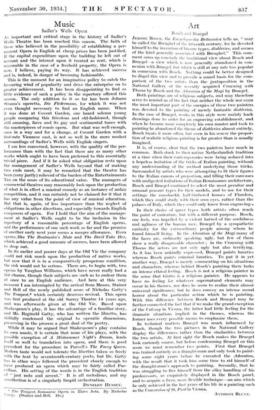Music Sadler's Wells Opera As' important and critical stage in
the history of Sadler's Wells Theatre has been reached this season. The faith of those who believed in the possibility of establishing a per- manent Opera in English at cheap prices has been justified. If the capital expenditure upon the building be left out of account and the interest upon it treated as rent, which is reasonable in the case of a freehold property, the Opera is .now, I believe, paying its way. It has achieved success and is, indeed, in danger of becoming fashionable.
This is the moment for an imaginative policy to catch the favouring wind of popularity and drive the enterprise on to greater achievement. It has been disappointing to find so little evidence of such a policy in the repertory offered this season. The only addition to it so far has been Johann Strauss's operetta, Die Fledermaus, for which it was not even thought necessary to find an English name. When it was done at Covent Garden, one heard solemn young people comparing this frivolous and old-fashioned, though still amusing, farce and its gay and sentimental tunes with the masterpieces of comic opera. But what was well enough, once in a way and for a change, at Covent Garden with a first-rate Viennese cast, is not so well in the more modest surroundings of Sadler's Wells with English singers.
I am less concerned, however, with the quality of the per- formance than with the fact that there are so many other works which ought to have been preferred to this essentially trivial piece. And if it be asked what obligation rests upon the management of Sadler's Wells beyond that of making two ends meet, it may be remarked that the theatre has been (very justly) relieved of the burden of the Entertainments Tax on the score of its educational value. The managers of commercial theatres may reasonably look upon the production of what is in effect a musical comedy as an instance of unfair competition, and it can certainly not be claimed for it that it has any value from the point of view of musical education. But that is, again, of less importance than the neglect of obligations in other directions, and especially towards English composers of opera. For I hold that the aim of the manage- ment at Sadler's Wells ought to be the inclusion in the repertory of a reasonable percentage of English operas, and the performance of one such work so far and the promise of another early next year seems a meagre allowance. Even operas, like The Boatswain's Mate and The Devil Take Her, which achieved a good measure of success, have been allowed to drop out.
In its earlier and poorer days at the Old Vie the company could not risk much upon the production of native works, but now that it is in a comparatively prosperous condition, the risk would not be serious. There are, to begin with, two operas by Vaughan Williams, which have never really had a fair chance, though their subjects are such as to endear them at once to an English audience. And here at this very moment I am interrupted by the arrival from Messrs. Stainer and Bell of the newly published score of Nicholas Gatty's The Tempest,* which certainly deserves revival. This opera was first produced at the old Surrey Theatre 14 years ago, and was afterwards given at the Old Vic. Based upon Shakespeare's play, it has the advantage of a familiar story, and Mr. Reginald Getty, who has written the libretto, has skilfully condensed the original to operatic dimensions, preserving in the process a great deal of the poetry.
While it may be argued that Shakespeare's play contains its own music; it is certain that none of his plays, with the possible exception of A Midsummer Night's Dream, lends itself so well to translation into opera, and there is good precedent for the procedure in Purcell's The Faery Queen. Modern taste would not tolerate the liberties taken so freely with the text by seventeenth-century poets, but Dr. Getty has in other ways followed the precedent closely enough to have produced an opera which may be fairly called Par- (Titian. His setting of the words is in the English tradition
" just note and accent." It is all melodious, and my recollection is of a singularly limpid orchestration.
DYNELEY HUSSEY.
* Tin Tempest, Romantic Opera in Three Acta. By Nicholas Catty. (Stainer and Bell. 10s.)










































 Previous page
Previous page